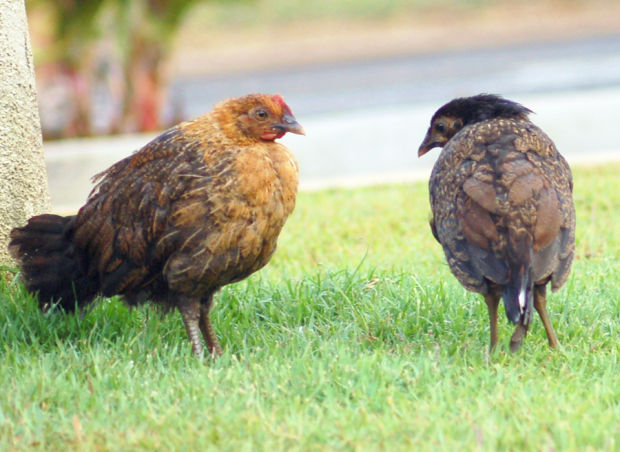LIHUE – State Rep. John Mizuno said he and other state lawmakers have been on their fair share of site visits during their time in office. But during one of his stops on Maui eight months ago with House Speaker
LIHUE – State Rep. John Mizuno said he and other state lawmakers have been on their fair share of site visits during their time in office.
But during one of his stops on Maui eight months ago with House Speaker Joseph Souki, something peculiar caught their eyes soon after they arrived in Kahului and drove around: the many feral chickens along the side of the road.
“I think we jokingly said, ‘Geez, with so many feral chickens, it’s so incredible how they’re all over the place. Somebody should do something,'” said Mizuno, D-Kalihi Valley-Moanalua.
It was an afterthought that, Mizuno said, later came to the forefront of his mind once he began receiving phone calls from constituents about their own feral chicken woes.
What Mizuno said he and some officials from The Humane Society of the United States are now proposing is a measure that would tackle feral chicken populations with a pesticide now used solely on wild pigeons.
If passed, that measure, House Concurrent Resolution 54, would ask the state office of the U.S. Department of Agriculture Wildlife Services to extend the use of OvoControl, a bird contraceptive, to feral chickens.
It would also ask the Department of Agriculture file the proper registration forms with the U.S. Environmental Protection Agency to allow the use of OvoControl for feral chickens in the state.
OvoControl is currently only allowed in Hawaii for use on pigeons.
According to an information sheet provided by Rancho Santa Fe, Calif.-based hatch control company Innolytics, LLC, which manufactures OvoControl, the pesticide interferes with the ability of bird eggs to hatch by preventing them from being fertilized.
Mizuno said the product has been effective in reducing the feral pigeon population by Waikiki businesses around the now-shuttered International Market Place area.
“This is not a buckshot approach,” Mizuno said. “It would be extremely limited only to those areas where you have a large feral chicken population and it’s in area where we don’t have native Hawaiian species of birds.”
But the bill has its critics.
Hawaii Board of Agriculture Chairman Scott Enright said the state Department of Agriculture has concerns with the proposed measure because there is a lack of data on how OvoControl may affect those who consume feral chickens that ingest the pesticide.
“There are other methods for controlling feral chickens that do not require the use of chemicals, and HDOA encourages the consideration of these alternative population control methods, such as trapping or shooting,” Enright wrote in a Mar. 20 letter to the House Committee on Agriculture. “It is known that feral chickens are consumed locally, and there is no data on the safety of human consumption on treated feral chickens or eggs with OvoControl in their system.”
Mizuno, however, disagrees.
“I’m just taken aback by that because trapping is not the most effective means of eradicating or reducing feral chicken populations, and shooting is an outright public safety issue,” Mizuno said. “It’s very concerning to have people walking around with a shooting device, especially in a heavily populated area with a lot of feral chickens.”
As a part of the EPA registration process, Enright said the Department of Agriculture would need to gather data on how to apply the pesticide to feral chickens and likely request funds to collect it.
The data gathering process alone, he said, “would be manpower intensive” and take over a year to conduct.
Kauai Humane Society Executive Director Penny Cistaro said she is concerned about the potential impacts on the island’s endemic birds.
“I know that people locally will trap the chickens and eat them and they do that at their own risk, I guess, if we’re going to start using OvoControl on this island, but my bigger concern is where is it going to be used and if the nene, shearwater, petrel or anything else can get into it,” Cistaro said. “While I support and applaud humane methods of control, I don’t know about putting chemicals out for other birds to be able to get.”
• Darin Moriki, county government reporter, can be reached at 245-0428 or dmoriki@thegardenisland.com. Follow him on Twitter at @darinmoriki.


